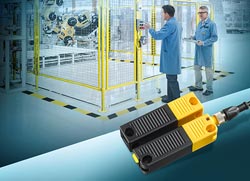Safety switch for protective equipment – contactless and tamper-proof

The new 3SE63 safety switch is based on contactless RFID (Radio Frequency Identification) transponder technology and offers a high level of protection against interference, tampering and bypassing. The rugged safety switch has a plastic enclosure providing a high degree of protection up to IP69K that is resistant to detergents and is designed for a long service life and for use under extreme environmental conditions.
It switches wear-free and covers a wide range of applications, including protective covers, flaps and doors that are difficult to adjust or that open and close frequently. The switch can be used in safety applications up to Performance Level e according to EN 13849-1 as well as SIL 3 according to IEC 61508/62061 and is suitable for connecting several devices in parallel.
The new 3SE63 safety switch satisfies the regulations for tamper-proof occupational safety protection through individual coding of the switch and actuator. The low-maintenance device is equipped with integrated monitoring functions for open-circuit, external voltage and cross-circuit, and has two short-circuit-proof 24 V DC safety outputs. Further comprehensive diagnostic functions, such as threshold indication, can be displayed on the status LEDs on the device or obtained from the diagnostics output for further processing. The new electronic safety switch has a larger switching displacement than mechanical switches and therefore a wider tolerance band. This means that the device can be mounted and adjusted quickly and easily.
The Siemens Industry Sector (Erlangen, Germany) is the worldwide leading supplier of environmentally friendly production, transportation and building technologies. With integrated automation technologies and comprehensive industry-specific solutions, Siemens increases the productivity, efficiency and flexibility of its customers in the fields of industry and infrastructure. In fiscal 2010, which ended on September 30, 2010, revenue from continuing operations of the Industry Sector (excluding Osram) totaled around €30.2 billion. At the end of September 2010, Siemens Industry Sector had around 164,000 employees worldwide without consideration of Osram. Further information is available on the Internet at: http://www.siemens.com/industry
The Siemens Industry Automation Division (Nuremberg, Germany) is a worldwide leader in the fields of automation systems, industrial controls and industrial software. Its portfolio ranges from standard products for the manufacturing and process industries to solutions for whole industrial sectors that encompass the automation of entire automobile production facilities and chemical plants. As a leading software supplier, Industry Automation optimizes the entire value added chain of manufacturers – from product design and development to production, sales and a wide range of maintenance services. With around 33,000 employees worldwide (September 30), Siemens Industry Automation posted sales of €6.2 billion in fiscal year 2010. http://www.siemens.com/industryautomation
Reference Number: IIA2011072529e
Media Contact
More Information:
http://www.siemens.com/industrial-controlsAll latest news from the category: Machine Engineering
Machine engineering is one of Germany’s key industries. The importance of this segment has led to the creation of new university degree programs in fields such as production and logistics, process engineering, vehicle/automotive engineering, production engineering and aerospace engineering among others.
innovations-report offers informative reports and articles covering technologies such as automation, motion, power train, energy, conveyor, plastics, lightweight construction, logistics/warehousing, measurement systems, machine tools and control engineering.
Newest articles

Properties of new materials for microchips
… can now be measured well. Reseachers of Delft University of Technology demonstrated measuring performance properties of ultrathin silicon membranes. Making ever smaller and more powerful chips requires new ultrathin…

Floating solar’s potential
… to support sustainable development by addressing climate, water, and energy goals holistically. A new study published this week in Nature Energy raises the potential for floating solar photovoltaics (FPV)…

Skyrmions move at record speeds
… a step towards the computing of the future. An international research team led by scientists from the CNRS1 has discovered that the magnetic nanobubbles2 known as skyrmions can be…





















